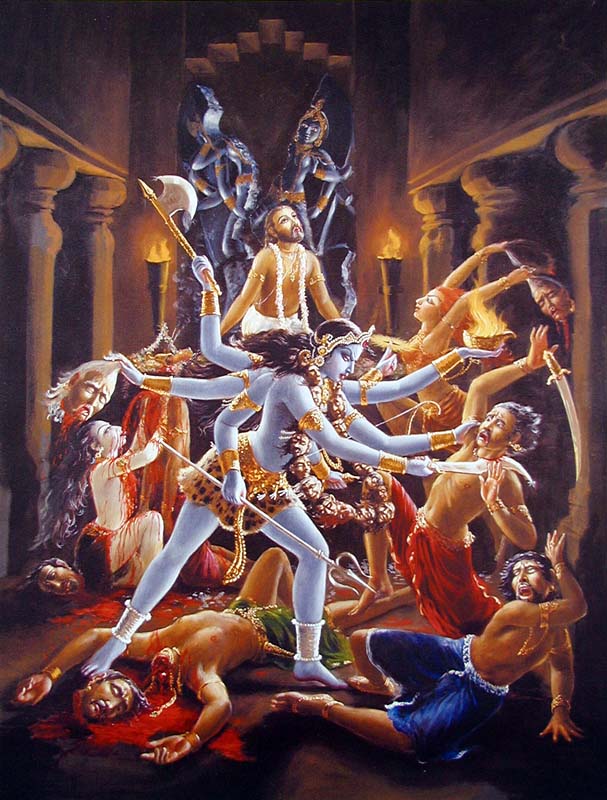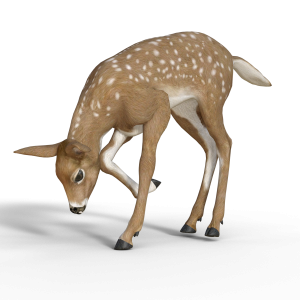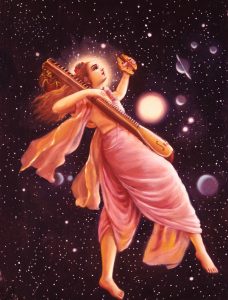
Śrīla Bhaktivedānta Nārāyaṇa Mahārāja: In Satya-yuga (the golden age), when the longevity of a person was 100,000 years, there was a king named Bharata. Bharata  Mahārāja realized that this world is a dark well. He realized that no one can be happy here, and that without practicing bhakti to Kṛṣṇa no one can be liberated and attain Kṛṣṇa’s pure loving service.
Mahārāja realized that this world is a dark well. He realized that no one can be happy here, and that without practicing bhakti to Kṛṣṇa no one can be liberated and attain Kṛṣṇa’s pure loving service.
When Bharata Mahārāja was 50,000 years old, he renounced the world. He gave up his wife, children, big kingdom, wealth, reputation, and all his possessions to go to the forest and perform bhajana.
What was his mentality when he left? If a man has so much pressure to pass stool and there is no chance to go to the latrine, then, when he finally passes somewhere he feels great relief. Bharata felt this relief when he left his wife, children, and kingdom.
He went to the forest, to a very beautiful place near a river, where he practiced bhakti-yoga.  One day, while he was in meditation, a pregnant deer came nearby to graze on some grass, and in the meantime a lion wanted to attack the deer. Bharata heard the lion’s roar, his samādhi trance was broken, and he saw that out of fear of the lion the pregnant deer was jumping across the river. As the deer jumped she gave birth to a baby deer, which had fallen from her womb and was now drowning in the river – sometimes surfacing and sometimes submerged under the water. In the meantime, with a pathetic glance that mother deer looked back and forth from Bharata Mahārāja to her baby, as if asking Bharata, “Can you please save my child?” Then she died.
One day, while he was in meditation, a pregnant deer came nearby to graze on some grass, and in the meantime a lion wanted to attack the deer. Bharata heard the lion’s roar, his samādhi trance was broken, and he saw that out of fear of the lion the pregnant deer was jumping across the river. As the deer jumped she gave birth to a baby deer, which had fallen from her womb and was now drowning in the river – sometimes surfacing and sometimes submerged under the water. In the meantime, with a pathetic glance that mother deer looked back and forth from Bharata Mahārāja to her baby, as if asking Bharata, “Can you please save my child?” Then she died.
Having come out of his trance, Bharata Mahārāja took the baby deer in his arms and then returned to his āśrama. The deer gradually grew, and now Bharata Mahārāja’s entire sense of mineness was transferred to this deer. He began thinking, “I am the father, mother, and friend of this deer. If I am not with her, who will take care of her? She will die.”
Gradually, the deer became bigger and bigger. Whenever Bharata was in trance and chanting his mantra, the deer would caress him with her head and jump into his lap; and Bharata Mahārāja could no longer concentrate on his mantras. In this way his thoughts became consumed by the deer, and he found himself doing ‘deer bhajana.’
One day a big group of deer came nearby, and the young deer considered, “They are my family!” She mixed with them and then went away. Bharata began searching, thinking, “Where is that deer? Perhaps a lion or tiger has killed her?!”
Where was Kṛṣṇa? Bharata Mahārāja had stopped his meditation on Kṛṣṇa and was no  longer chanting His holy names. Rather, he was always thinking, “Deer, deer, deer.” In the meantime, at the time of Bharata’s death his thoughts were still absorbed in “Deer, deer, deer.”
longer chanting His holy names. Rather, he was always thinking, “Deer, deer, deer.” In the meantime, at the time of Bharata’s death his thoughts were still absorbed in “Deer, deer, deer.”
What became of Bharata Mahārāja? He became a deer in his next life. If at the time of death one thinks of his wife, daughter, son, wealth, dogs, etc., he will become like that object of meditation. What happened after this?
Vrajanātha dāsa: In his next life, Bharata Mahārāja took birth as a deer. We have heard how by becoming attached to any object and always remembering that object, we become devoid of our inclination to worship God, Kṛṣṇa.
By the mercy of Kṛṣṇa, in his next life as a deer, Bharata Mahārāja remembered that in his previous life he had become side-tracked. Instead of perfecting his bhajana, he had become attracted to a deer. He had lost the opportunity to remember Kṛṣṇa at the time of death and thus become liberated and engaged in the service of Kṛṣṇa. He now thought, “This time I should not become entangled in any activity that will cause me to take birth again and again in this cycle of birth and death.” He went to the same āśrama of ṛṣis and stayed nearby, always remembering how he had lost…
Śrīla Bhaktivedānta Nārāyaṇa Mahārāja: In the form of a deer he was hearing their harikathā and taking bath in the Ganges.
Vrajanātha dāsa: Yes, he was very fortunate.
Eventually the time of death came again, and in his next life Bharata Mahārāja became the very great saintly personality, Jaḍa Bharata. He took birth in a very pious family, so from birth he was engaged in many auspicious activities.
He was thinking, “I should not be entangled in this world anymore. If I obey the advice of my father and brothers, then again I may be entangled in so much karma. If I meditate upon Śrī Kṛṣṇa and behave as if I am deaf and dumb, as though I do not understand anything, then my good fortune will be that this is my last life and I will attain perfection.”
Thinking in this way, he did the opposite of everything his father tried to teach him. His father considered, “My son cannot follow proper advice.” He asked his other sons, “Always look after your brother.”
Śrīla Bhaktivedānta Nārāyaṇa Mahārāja: And then the father died.
Vrajanātha dāsa: After some time the father died, and Jaḍa Bharata’s brothers thought, “Our brother is dumb, and he doesn’t understand anything. We should just keep him near the fields to protect us from dangerous animals and birds, like a guard.”
Śrīla Bhaktivedānta Nārāyaṇa Mahārāja: What were they giving him to eat?
Vrajanātha dāsa: They used to give him only leftovers, but Jaḍa Bharata never complained. He ate whatever was given to him and he was quite healthy.
While he was protecting the field, a band of worshipers of the demigoddess Kali approached him. They had been looking for an opportunity to offer some sacrifice to their worshipful deity. They had captured a man to offer to Kali but he had run away. When they saw Jaḍa Bharata, they thought he was very fit to be offered to her.
Śrīla Bhaktivedānta Nārāyaṇa Mahārāja: They thought, “He has all the symptoms of a very good offering.”
Vrajanātha dāsa: So they caught him, and he did not protest. That was his nature: “Whatever God has arranged, I will accept, but I will not become attached.” Thus, he let them take him to offer to Kali. According to the system of offering human sacrifices, the dacoits put his head on a stone and were ready to cut off his head. However, just as they were about to cut his head, Kali burst out of her statue. Carrying big swords, she and her associates cut off all the dacoits’ heads; they were all slaughtered. Only Jaḍa Bharata was protected, because he was Kṛṣṇa’s devotee. Kali could not tolerate the thought of his being killed.
Śrīpāda Mādhava Mahārāja: Kali said to him, “Prabhu, why are you hiding yourself?”
Vrajanātha dāsa: Kali said to him, “Why are you hiding your glories? You are a great devotee. You must help others and enlighten them.” Jaḍa Bharata was then thinking about how to continue, and as he was…
Śrīla Bhaktivedānta Nārāyaṇa Mahārāja: (To Tamopahā dāsa) What happened after that?
Tamopahā dāsa: After that he was taken by King Rahūgaṇa’s soldiers and forced to carry the king’s palanquin.
Śrīla Bhaktivedānta Nārāyaṇa Mahārāja: Where was the king going?
Śrīpāda Mādhava Mahārāja: King Rahūgaṇa was on his way to Kapila’s āśrama to learn philosophy.
Śrīla Bhaktivedānta Nārāyaṇa Mahārāja: Why was he going to Kapila’s āśrama?
Tamopahā dāsa: He was going to learn brahma-jñāna (knowledge of impersonal spirit beyond matter).
Śrīla Bhaktivedānta Nārāyaṇa Mahārāja: Tattva-jñāna (knowledge of all established spiritual truths).
Tamopahā dāsa: He was carrying the palanquin with the other carriers, but sometimes he saw ants and didn’t want to step on them. He would therefore stop and walk around them, at which time the palanquin would almost fall over. The other carriers warned him not to do that, but he did it again, and the king and his ministers became angry.
King Rahūgaṇa called out to him, “Don’t you know that I am the king? Why are you doing this? You can be punished very severely.” After some discussion, Jaḍa Bharata explained to him some very important verses:
rahūgaṇaitat tapasā na yāti
na cejyayā nirvapaṇād gṛhād vā
na cchandasā naiva jalāgni-sūryair
vinā mahat-pāda-rajo-’bhiṣekam
(Śrīmad-Bhāgavatam 5.12.12)
[My dear King Rahūgaṇa, unless one has the opportunity to smear his entire body with the dust of the lotus feet of great devotees, one cannot realize the Absolute Truth. One cannot realize the Absolute Truth simply by observing celibacy (brahmacarya), strictly following the rules and regulations of householder life, leaving home as a vānaprastha, accepting sannyāsa, or undergoing severe penances in winter by keeping oneself submerged in water or surrounding oneself in summer by fire and the scorching heat of the sun. There are many other processes to understand the Absolute Truth, but the Absolute Truth is only revealed to one who has attained the mercy of a great devotee.]
Without smearing the dust of a pure devotee on one’s body, there is no hope. Not by tapasya, penances, nor by becoming a sannyāsī; nor by chanting ślokas of the Vedas can one achieve the Supreme. There is a penance wherein one sits in a cold river in the winter, and another wherein one sits under the sun with fires all around him in the summer. There  are many yogīs who do this in the Himālayas, but they do not achieve any perfection. The only thing that will give a person perfection is getting one particle of the dust of a pure devotee on one’s head. This is the path to perfection.
are many yogīs who do this in the Himālayas, but they do not achieve any perfection. The only thing that will give a person perfection is getting one particle of the dust of a pure devotee on one’s head. This is the path to perfection.
Jaḍa Bharata told this to the king, who was struck with wonder. Although Jaḍa Bharata with his matted locks was looking like a dumb, retarded man, he was speaking the highest philosophy. The king understood his glories.
Śrīla Bhaktivedānta Nārāyaṇa Mahārāja: The king asked him, “Who are you?”
(To Śrīpāda Mādhava Mahārāja) And what did he reply?
Śrīpāda Mādhava Mahārāja: The king asked Jaḍa Bharata, “Are you Kapiladeva? Are you any of the Nava-yogendras? I am on my way to learn all of this philosophy. Who are you?” He jumped from his palanquin and asked these questions.
Jaḍa Bharata replied, “Have you heard of Bharata Mahārāja in your dynasty? I am referring to the king whose land Bhārata-varṣa is named after.”
The king said, “Yes.”
Then Bharata said, “I am that same person.” He then began to tell the history of how he gave up his kingdom, wife, and children. It is stated in Śrīmad-Bhāgavatam:
yo dustyajān dāra-sutān
suhṛd rājyaṁ hṛdi-spṛśaḥ
jahau yuvaiva malavad
uttamaśloka-lālasaḥ
(Śrīmad-Bhāgavatam 5.14.43)
[While in the prime of life, the great Mahārāja Bharata gave up everything because he was fond of serving the Supreme Personality of Godhead, Uttamaśloka. He gave up his beautiful wife, nice children, great friends, and an enormous empire. Although these things are very difficult to give up, Mahārāja Bharata was so exalted that he gave them up just as one gives up stool after evacuating. Such was his greatness.]
Bharata Mahārāja then told King Rahūgaṇa the history of his becoming entangled with a deer, and how he came to this position. King Rahūgaṇa became very happy, and greatly honoured him. The king thus became successful by hearing all of Bharata Mahārāja’s instructions.
The main thing is that if someone wants to advance in Kṛṣṇa consciousness and make his life successful, he must follow three principles:
bhakta-pada-dhūli āra bhakta-pada-jala
bhakta-bhukta-avaśeṣa, — tina mahā-bala
(Śrī Caitanya-caritāmṛta, Antya-līlā 16.60)
[The dust of the feet of a devotee, the water that has washed the feet of a devotee, and the remnants of food left by a devotee are three very powerful substances.]
Bhakti-pada-dhūli refers to the foot-dust of devotees. One may think, “He is a human being, like myself. His foot-dust and my foot-dust are the same, because our feet walk in the same places. I know better than him. Why should I respect him so much?”
Here is an analogy. If there is one drop of poison on your food, even if your eyes cannot  detect the poison, it will act and you will die. In the similar way, if a liberated soul has stepped somewhere on the land and you go to that same place, even without knowledge of its significance, this will benefit your soul.
detect the poison, it will act and you will die. In the similar way, if a liberated soul has stepped somewhere on the land and you go to that same place, even without knowledge of its significance, this will benefit your soul.
Bhakta-pada-jala refers to the foot-bathing water of devotees. Even Bhagavān wants such foot-bathing water.
Once, Kṛṣṇa became very sick and no one could cure Him. Nārada Ṛṣi came to Him and asked, “Prabhu, how can You be cured?” Kṛṣṇa told him, “I will be cured if I get the foot-dust of My devotees to place on My head.”
Nārada Ṛṣi then went to the heavenly planets, Vaikuṇṭha, and many other places; but no one would give him their foot-dust for Kṛṣṇa. They were afraid they would go to hell for giving their foot-dust for God’s head and body.
Nārada Ṛṣi then went to Vraja, where the gopīs said, “We are prepared to give Him foot-dust.” Nārada asked, “Are you not afraid that if you give Kṛṣṇa your foot-dust, you will go to the hellish planets?” The gopīs replied; “We don’t care for hellish planets. Kṛṣṇa must be cured. We can reside in hell life after life, birth after birth; we have no problem with that. But Kṛṣṇa must be cured.” Then they gave Nārada Ṛṣi their foot-dust.
Nārada Ṛṣi brought this dust to Kṛṣṇa in Dvārakā, and Kṛṣṇa smeared His whole body with that dust.
Śrīla Bhaktivedānta Nārāyaṇa Mahārāja: Be brief.
Śrīpāda Mādhava Mahārāja: Kṛṣṇa put the leftover foot-dust in a pond, and this became the tilaka that we use now – gopī-candana.
The third powerful substance is bhakta-bhukta-avaśeṣa, which refers to the remnants of the pure devotee. Such remnants are of two types: the hari-kathā coming from their lotus lips, and their prasādam remnants. By that prasādam, one can conquer māyā.
If someone wants to be free from anarthas and māyā, he will have to serve these three things. He will then advance in Kṛṣṇa consciousness, and his life will be successful. This is the essence of the teachings of Bharata Mahārāja. Hare Kṛṣṇa.
Śrīla Bhaktivedānta Nārāyaṇa Mahārāja: There are two important points in this  connection. First, if you want to do bhajana and you have therefore left your wife, children, and everything else, then don’t again become attached to any person or object. Be attached only to Kṛṣṇa’s name, beauty, and everything in relation to Kṛṣṇa.
connection. First, if you want to do bhajana and you have therefore left your wife, children, and everything else, then don’t again become attached to any person or object. Be attached only to Kṛṣṇa’s name, beauty, and everything in relation to Kṛṣṇa.
Second, even if you are gṛhasthas, householders, do not be attached to your house, office, etc. You can be there physically, supporting your children and wife, and others – as your duty. This is your duty, but it is essential to give up thinking, “I am the owner of all this.” Don’t be attached. Somehow support your life with whatever you have, and do bhajana. If you are attached to anyone, at the time of death you will again become hogs, pigs, dogs, cats, etc. If you have a cat, don’t be attached to it. Otherwise you will have to become a cat.
Śrīla Bhaktivedānta Nārāyaṇa Mahārāja: What did I say about Bharata Mahārāja in yesterday’s class? Who can explain?
Śrīpāda Padmanābha Mahārāja: You said that just as Bharata made the mistake of becoming so absorbed in the baby deer that, even though he was highly qualified in bhakti, he had to take birth as a deer.
Śrīla Bhaktivedānta Nārāyaṇa Mahārāja: This answer will not suffice. The point is that what one remembers at the time of death determines what one will become.
Śrīla Bhaktivedānta Nārāyaṇa Mahārāja:
‘sādhu-saṅga’, ‘sādhu-saṅga’—sarva-śāstre kaya
lava-mātra sādhu-saṅge sarva-siddhi haya
The verdict of all revealed scriptures is that by even a moment’s association with a pure devotee one can attain all success.
If one is in sādhu-saṅga for even a moment, it will not go in vain. But this [association] should be taken with honour and very strong belief. Otherwise there will be no effect. No effect.
Bharata Mahārāja was a very advanced Vaiṣṇava and was just about to attain rati (the stage of bhāva). He had crossed niṣṭhā-bhakti and also the stage of ruci, relish for the holy name and hari-kathā. He had become very renounced and had entered the stage of āsakti. He left his home, wife, children – everything. He came to a very dense forest, and there he lived alone, chanting and remembering. But what happened? He became attached to a deer who was drowning in the river. He took pity on that baby deer. This is called mercy in the mode of goodness. Devotees should be merciful but not attached. Bharata Mahārāja was correct in being merciful, but he became attached, and thus his attachment to Kṛṣṇa diminished. Soon  he died and [at the time of death], remembering only that deer, he became a deer. He was most careful in his second birth and also in his third.
he died and [at the time of death], remembering only that deer, he became a deer. He was most careful in his second birth and also in his third.
Therefore you, also, should be careful about this. Even in a high stage there is a chance of falling down. You may be chanting and remembering, but because you are still full of anarthas you still have no taste (ruci), and there is so much chance of your falling. We should, therefore, always be in elevated association. If Bharata Mahārāja had been with Nārada, he would not have continued in this world for three lives. But he did not have such association. Try, therefore, even at the stage of niṣṭhā or ruci, to always be in the association of advanced devotees.
Image/Art made possible by Pixabay.com & Krishnapath.org








